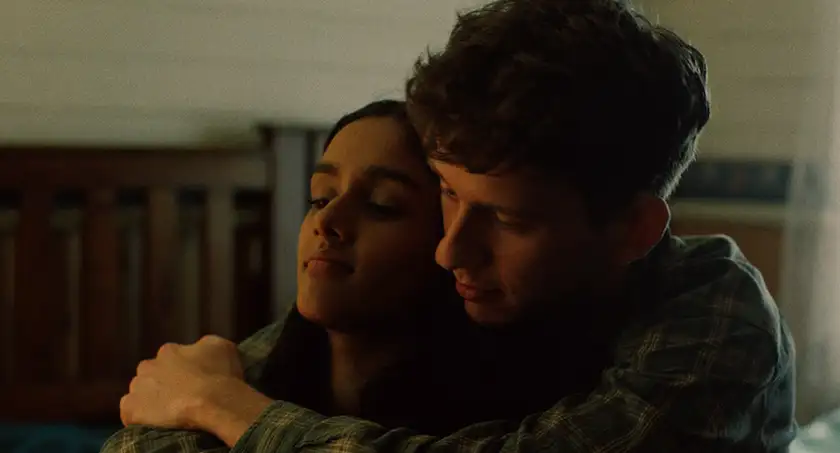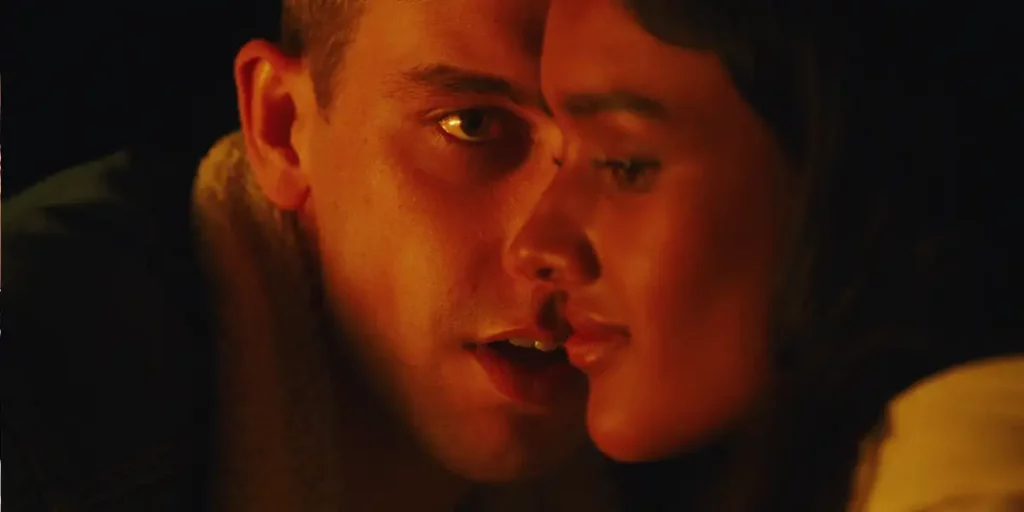Saturated with tension and unease, Birdeater is a tale of abuse and toxic masculinity, which may be a challenging watch for some.
*This review of the film Birdeater discusses substance and emotional abuse, which may be triggering for some*
The weeks leading up to a marriage should be one of the happiest times in a couple’s lives, though that doesn’t appear to be the case for Louie (Mackenzie Fearnley) and Irene (Shabana Azeez, of the television series Metro Sexual). During the opening scenes of Birdeater, we see glimpses of affection between the pair, but their relationship is undeniably unconventional. Whenever Louie leaves their apartment, he brings Irene a glass of water to help her consume a sedative. She takes a pill whenever her significant other departs from the house due to separation anxiety. Louie has multiple excuses for consistently stepping away from their residence, though none of his reasons are sincere. He is living his life to the fullest while a timid Irene waits for him to return home and can’t bear to be apart from him.
When Louie suggests a bachelor party with his school pals to celebrate his soon-to-be marriage to Irene, the thought of her beau being away for the weekend makes Irene panic. This results in Louie inviting her along to the boy’s outing. However, Louie’s friends in attendance, Dylan (Ben Hunter, of RFDS), Murph (Alfie Gledhill), and Charlie (Jack Bannister)—who also brings his partner Grace (Clementine Anderson) along—are perplexed by Louie and Irene’s relationship. Louie has a mysterious scar on his head, and the group believes that Irene caused it. What starts as a chill gathering in a remote, peaceful setting turns into a distressing disaster as the repulsive traits of each man within the friend group are exposed for all to see.
Birdeater has hard-hitting themes that are challenging to observe, though vitally important to portray. For one, the film depicts emotional abuse that occurs in romantic relationships and the trauma bonds that can be created as a byproduct. At one point, Irene feels anxious and helpless when Louie isn’t around her. During other moments, she demonstrates an awareness of their unhealthy romance. She even tries to end her relationship with Louie months before their engagement. Ultimately, guilt (and perhaps the need for a green card) prevents her from leaving, along with Louie’s manipulation tactics, which are gradually revealed throughout the film. He uses various strategies to control and gaslight Irene, and the cracks in their relationship start to show.

Louie and Irene’s dynamic highlights the fear of letting go of relationships that are detrimental to one’s emotional well-being due to the uncertainty of what’s on the other side of a familiar existence. After all, rebuilding our lives can be a daunting experience. The narrative also shows the psychological impacts of emotional abuse, leading to self-esteem issues, isolation, and anxiety.
The cast gives outstanding performances, as all the men are unlikeable characters who are unbearable to watch. However, co-directors Jack Clark and Jim Weir do not want the audience to warm to any of the men present. Instead, viewers are invited to spend the night with a group of detestable fellows who have never had to take accountability for their atrocious behavior. Every moment spent with them in the outback is an excruciating ordeal, and tension builds under the surface like a volcano waiting to erupt.
Louie and his school friends’ unruly behavior, sense of entitlement, and some of the individuals’ inability to take no for an answer send shivers down your spine. The unsettling atmosphere leaves you hoping you’ll never have the misfortune of finding yourself in a similar situation. The purposeful, isolated setting only exacerbates the dread. No matter where you turn, you can’t escape.
Birdeater also explores toxic masculinity exceptionally well, which is reflected through the aggression and dominance of each man within the friend group. We see the lads popping pills, downing beers, and acting like a bunch of hooligan teenagers on their first-ever holiday. Dylan is the life and soul of the party and exposes undesirable information about Louie whenever he doesn’t get his way. At first, Charlie appears to be the sensible friend who has matured from the crowd he grew up with, though as the bachelor party unfolds, he’s not so pleasant after all. They all adore Louie as he’s a seemingly nice guy and the most unlikely abuse culprit. This goes to show that appearances and personas can be misleading.
The emotional abuse and toxic relationships reflected in Birdeater are disturbingly real, and with such challenging topics, the film’s almost two-hour runtime feels somewhat excessive. Some scenes drag on, emphasizing points repeatedly, which slows the pace and detracts from the flow. Each scene is steeped in never-ending discomfort, while viewers hope for character redemption arcs that never arrive.
The film’s ability to build unease until its final moments proves Clark and Weir’s talent as filmmakers and there’s no denying that the feature has a strong impact. However, this movie won’t appeal to everyone, and some viewers will find it incredibly difficult to watch. A taxing experience that doesn’t let up until its final moments, Birdeater displays physiological manipulation, the societal impacts of toxic masculinity, and emotional abuse, all of which are painfully authentic.
Birdeater was screened at the Overlook Film Festival on April 5, 2024 and will be released in US theaters and on Digital Platforms on January 10, 2024.

